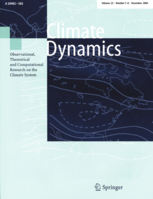The National Climate Assessment (NCA) is a United States government interagency ongoing effort on climate change science conducted under the auspices of the Global Change Research Act of 1990. The NCA is a major product of the U.S. Global Change Research Program (USGCRP) which coordinates a team of experts and receives input from a Federal Advisory Committee. NCA research is integrated and summarized in the mandatory ongoing National Climate Assessment Reports. The reports are "extensively reviewed by the public and experts, including federal agencies and a panel of the National Academy of Sciences. For the Third National Climate Assessment, released in 2014, USGCRP coordinated hundreds of experts and received advice from a sixty-member Federal Advisory Committee. The Fourth NCA (NCA4) was released in two volumes, in October 2017 and in November 2018.
The impact factor (IF) or journal impact factor (JIF) of an academic journal is a scientometric index calculated by Clarivate that reflects the yearly mean number of citations of articles published in the last two years in a given journal, as indexed by Clarivate's Web of Science. As a journal-level metric, it is frequently used as a proxy for the relative importance of a journal within its field; journals with higher impact factor values are given the status of being more important, or carry more prestige in their respective fields, than those with lower values. While frequently used by universities and funding bodies to decide on promotion and research proposals, it has come under attack for distorting good scientific practices.
Energy & Environment is an academic journal "covering the direct and indirect environmental impacts of energy acquisition, transport, production and use". Under its editor-in-chief from 1998 to 2017, Sonja Boehmer-Christiansen, it was known for easygoing peer-review and publishing climate change denial papers. Yiu Fai Tsang became its editor-in-chief in May 2017.

The Potsdam Institute for Climate Impact Research is a German government-funded research institute addressing crucial scientific questions in the fields of global change, climate impacts, and sustainable development. Ranked among the top environmental think tanks worldwide, it is one of the leading research institutions and part of a global network of scientific and academic institutions working on questions of global environmental change. It is a member of the Leibniz Association, whose institutions perform research on subjects of high relevance to society.

Aquatic Botany is a peer-reviewed scientific journal covering research on structure, function, dynamics, and classification of plant-dominated aquatic communities and ecosystems, as well as molecular, biochemical, and physiological aspects of aquatic plants. It publishes fundamental as well as applied research. The journal was established in 1975 by Cees den Hartog, who still serves as consulting editor. It is published by Elsevier and the editors-in-chief are E.M. Gross, Thomas Wernberg and Brigitta van Tussenbroek.

The European Biophysics Journal is published by Springer Science+Business Media on behalf of the European Biophysical Societies Association. The journal publishes papers in the field of biophysics, defining this as the study of biological phenomena using physical methods and concepts. It publishes original papers, reviews and letters. The journal aims "to advance the understanding of biological structure and function by application of the principles of physical science, and by presenting the work in a biophysical context". The editor-in-chief of the journal is Robert Gilbert.

Anders Levermann is a climate scientist at the Potsdam Institute for Climate Impact Research and Columbia University. He is a Professor of the Dynamics of the Climate System at Institute for Physics and Astrophysics of the Potsdam University, Germany. He has been involved in the assessment report of the Intergovernmental Panel on Climate Change since 2004. Levermann advises political and economic stakeholders on the issue of climate change.

The Journal of Personality is a bimonthly peer-reviewed academic journal covering personality psychology. It is published by Wiley-Blackwell and the editor-in-chief is Howard Tennen. The journal covers research on personality, particularly on personality and behavior dynamics, personality development, and cognitive, affective, and interpersonal individual differences. According to the Journal Citation Reports, the journal has a 2020 impact factor of 5.117.

Metallomics is a monthly peer-reviewed scientific journal covering the growing research field of metallomics. The journal's scope is aimed at "elucidating the identification, distribution, dynamics, role and impact of metals and metalloids in biological systems". It is published by the Royal Society of Chemistry. The executive editor is Jeanne Andres, while the current chair of the editorial board is David Giedroc at Indiana University Bloomington.

Briefings in Bioinformatics is a peer-reviewed scientific journal covering bioinformatics, including reviews of databases and analytical tools for genetics and molecular biology. It also publishes primary research papers on novel bioinformatic models and tools. It is published by Oxford University Press. The EMBnet community was initially involved in the creation of the journal. BiB was also supported by an educational grant from EMBnet.

Surveys of scientists' views on climate change – with a focus on human-caused or anthropogenic global warming (AGW) – have been undertaken since the 1990s. A 2016 paper concluded that "the finding of 97% consensus [that humans are causing recent global warming] in published climate research is robust and consistent with other surveys of climate scientists and peer-reviewed studies." A 2019 study found scientific consensus to be at 100%, and a 2021 study found that consensus exceeded 99%.
Developmental Dynamics is a peer-reviewed scientific journal of developmental biology that was established in 1901 as the American Journal of Anatomy. It obtained its current name in 1992 and is one of three official journals of the American Association of Anatomists. The journal is published monthly by John Wiley & Sons.

Group Dynamics: Theory, Research, and Practice is a peer-reviewed academic journal published by Division 49 of the American Psychological Association. The journal was created in 1997 and includes research on group dynamics, defined by the editors as "the scientific study of all aspects of groups." The current editor-in-chief is David K. Marcus of Washington State University.

Nature Climate Change is a monthly peer-reviewed scientific journal published by Nature Publishing Group covering all aspects of research on global warming, the current climate change, especially its effects. It was established in 2011 as the continuation of Nature Reports Climate Change, itself established in 2007. Its first editor-in-chief was Olive Heffernan and the journal's current editor-in-chief is Bronwyn Wake. According to the Journal Citation Reports, the journal had a 2020 impact factor of 21.722.
Advances in Atmospheric Sciences is a bimonthly peer-reviewed scientific journal co-published by Springer Science+Business Media and Science Press. It covers research on the dynamics, physics and chemistry of the atmosphere and oceans, including weather systems, numerical weather prediction, climate dynamics and variability, and satellite meteorology. It was established in 1984. The editors-in-chief are Mu Mu, Junji Cao, and Ming Xue. According to the Journal Citation Reports, the journal has a 2020 impact factor of 3.158.

The contributions of women in climate change have received increasing attention in the early 21st century. Feedback from women and the issues faced by women have been described as "imperative" by the United Nations and "critical" by the Population Reference Bureau. A report by the World Health Organization concluded that incorporating gender-based analysis would "provide more effective climate change mitigation and adaptation."
European Political Science Review (EPSR) is a quarterly peer-reviewed academic journal published by Cambridge University Press in conjunction with the European Consortium for Political Research featuring scholarly research in political science. The journal covers not only European political issues, but also includes global issues and non-European topics. The joint editors-in-chief are Carlos Closa (Institute for Public Goods and Policies, Spanish National Research Council) and Matt Qvortrup (Coventry University).
Fluid Dynamics Research is a bimonthly peer-reviewed scientific journal covering all fields of fluid dynamics. It is published by IOP Publishing on behalf of the Japan Society of Fluid Mechanics. The editor-in-chief is Genta Kawahara. According to the Journal Citation Reports, the journal has a 2021 impact factor of 1.500.
Earth System Dynamics is a peer-reviewed open access scientific journal published by Copernicus Publications on behalf of the European Geosciences Union. The journal publishes articles describing original research on the geology, climate change, and atmospheric science.
Peter George Baines is an Australian geophysicist. He is an honorary senior fellow at University of Melbourne and a Fellow of the Royal Society of Victoria.











